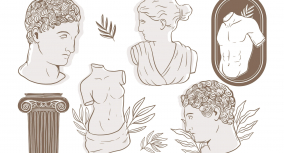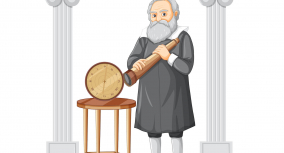Ancient Greek epic poetry, especially Homer’s works, are full of mythological and cultural symbolism. In The Odyssey, symbols are used to highlight philosophical lessons behind the plot. Odysseus’ bow, the sea, Penelope’s shroud, the marriage bed, and other symbols in The Odyssey are essential to the story. They add a deeper meaning to it and reflect values of ancient Greek culture.
Keep reading this guide by Custom-Writing.org’s experts to learn more about the most significant symbols in The Odyssey, their meaning, and importance.
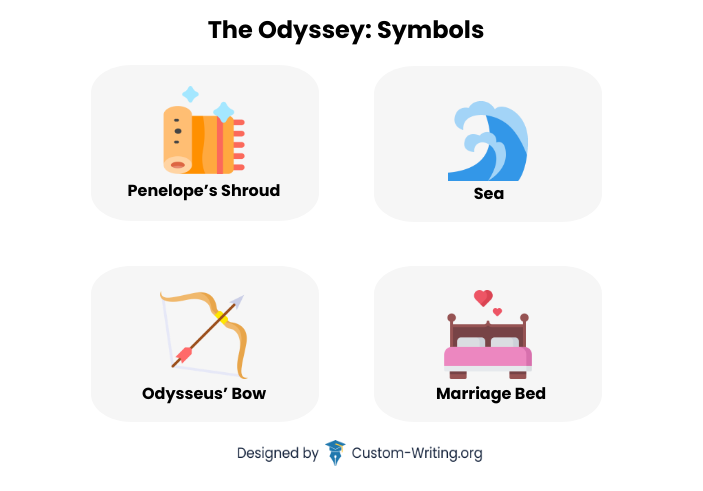
Main Symbols in The Odyssey
Symbolism in The Odyssey: Penelope’s Shroud
One of the central symbols in the epic is Penelope’s shroud. It represents the cunning which the Queen of Ithaca employs to oppose the suitors.
The readers first meet Penelope weaving the shroud. This small detail plays a crucial role in understanding the central idea of The Odyssey. Lacking physical strength to deal with the annoying admirers, Penelope finds another way to resist them. She uses her savvy and cleverness to prove her loyalty to her beloved husband.
Penelope decides that weaving a shroud for her dying father-in-law Laertes can delay the suitors. She claims that she will choose her new husband after she finishes her work. Shroud weaving was a prevalent task for women of ancient Greece. So, nobody suspects Penelope was lying.
Moreover, the Queen weaves demonstratively. During the day, she works on the large weaving loom in spacious royal halls full of tapestries and other luxuries. However, during the night, when nobody sees, she unravels everything she has done.
A shroud for Laertes symbolizes Penelope’s intelligence and cunning she shares with her husband. Odysseus wouldn’t have choosen a simple-minded woman to become his wife. So, Penelope proves she’s her spouse’s perfect partner.
Also, Laertes’ shroud reflects Penelope’s loyalty to the marriage. Waiting for Odysseus for 20 years, she remains faithful to him. The Queen might have chosen another man and built a happy life with him. However, she resists this temptation. As a result, Penelope gets rewarded: Odysseus finally returns home, and their family gets reunited after long years of separation.
Quotes about Shroud
This was her latest masterpiece of guile:
The Odyssey, Antinous, Book II
she set up a great loom in the royal halls
and she began to weave, and the weaving finespun,
the yarns endless, and she would lead us on: ‘Young men,
my suitors, now that King Odysseus is no more,
go slowly, keen as you are to marry me, until
I can finish off this web …
so my weaving won’t all fray and come to nothing.
This is a shroud for old lord Laertes, for that day
when the deadly fate that lays us out at last will take him down.’
All just sat there, silent …
The Odyssey, Antinous, Book II
no one had the heart to reply with harshness.
Only Antinous, who found it in himself to say:
[…]
“Her very words,
and despite our pride and passion we believed her.
So by day she’d weave at her great and growing web—
by night, by the light of torches set beside her,
she would unravel all she’d done.”
Famous Atrides!
The Odyssey, Amphimedon’s ghost, Book XXIV
Amphimedon’s ghost called back:
We were courting the wife of Odysseus, gone so long.
She neither spurned nor embraced a marriage she despised,
no, she simply planned our death, our black doom!
[…]
Three whole years
she deceived us blind, seduced us with this scheme …
Then, when the wheeling seasons brought the fourth year on
and the months waned and the long days came round once more,
one of her women, in on the queen’s secret, told the truth
and we caught her in the act—unweaving her gorgeous web.
So she finished it off. Against her will. We forced her.
But just as she bound off that great shroud and washed it,
The Odyssey, Amphimedon’s ghost, Book XXIV
spread it out—glistening like the sunlight or the moon—
just then some wicked spirit brought Odysseus back,
from god knows where, to the edge of his estate
where the swineherd kept his pigs. And back too,
to the same place, came Odysseus’ own dear son,
scudding home in his black ship from sandy Pylos.
What Does the Sea Symbolize in The Odyssey?
The Odyssey setting plays a crucial role in the whole epic. The entire poem describes the main hero’s journey sailing from Troy to Ithaca. Naturally, the sea becomes the central setting of The Odyssey and one of its main symbols. Essentially, it represents both a physical and metaphorical journey.
In the epic, the sea has two meanings:
- suffering, hardships, danger, and the human’s weaknesses and vulnerability against gods;
- life as a whole.
The first meaning is reflected throughout the whole story, while the second meaning can be grasped only after reading the entire poem.
First, let’s discuss the sea as a symbol of danger and humans’ vulnerability against gods. In The Odyssey, many antagonists create obstacles on Odysseus’s way home. For example, there are Circe and Calypso, who delay the King’s return to Ithaca. Then, there are the monsters, the symbol of danger to Odysseus and his crew. However, the most potent and furious enemy is the Greek god of the sea – Poseidon.
The readers don’t know the roots of Poseidon’s anger at Odysseus. It likely started from the times of the Trojan War. The main character became the real hero and turned the tide in that war in favor of Greece. Poseidon wasn’t happy about that because, according to The Iliad, he favored the Trojans. The situation with the cyclops Polyphemus, Poseidon’s son whom Odysseus blinded, sparked the god’s grudge.
As a result, the god of the sea creates many dangerous obstacles for the protagonist. He causes massive storms, damages Odysseus’s ship, and prevents the King from reaching Ithaca.
Besides Poseidon, the epic includes other sea creatures who threaten Odysseus’ life. They are the Sirens willing to murder him, and Scylla and Charybdis from the Back Sea who regularly harm sea travelers. The natural force of the sea is sometimes too strong. Even Athena, with the assistance of his father, Zeus, is incapable of resisting it. Nevertheless, brave and persistent Odysseus deals with all the challenges and finally reaches home.
So, at the end of the story, the sea becomes a symbol of life itself. To achieve the desired goal, Odysseus went through a sequence of challenges. He was scared, exhausted, tired, but he never lost his enthusiasm. That’s the deeper meaning of the sea in The Odyssey. Life is complicated, but every goal is achievable if you put in enough effort.
Quotes about Sea
But just as great Odysseus thrashed things out,
The Odyssey, Narrator, Book V
Poseidon god of the earthquake launched a colossal wave,
terrible, murderous, arching over him, pounding down on him,
hard as a windstorm blasting piles of dry parched chaff,
scattering flying husks—so the long planks of his boat
were scattered far and wide.
First you will raise the island of the Sirens,
The Odyssey, Circe, Book XII
those creatures who spellbind any man alive,
whoever comes their way. Whoever draws too close,
off guard, and catches the Sirens’ voices in the air—
no sailing home for him, no wife rising to meet him,
no happy children beaming up at their father’s face.
The high, thrilling song of the Sirens will transfix him,
lolling there in their meadow, round them heaps of corpses,
rotting away, rags of skin shriveling on their bones …
No mariners yet can boast they’ve raced their ship
The Odyssey, Circe, Book XII
past Scylla’s lair without some mortal blow—
with each of her six heads she snatches up
a man from the dark-prowed craft and whisks him off.
The other crag is lower—you will see, Odysseus—
The Odyssey, Circe, Book XII
though both lie side-by-side, an arrow-shot apart.
Atop it a great fig-tree rises, shaggy with leaves;
beneath it awesome Charybdis gulps the dark water down.
Three times a day she vomits it up, three times she gulps it down,
that terror!
With that he rammed the clouds together—both hands
The Odyssey, Narrator, Book V
clutching his trident—churned the waves into chaos, whipping
all the gales from every quarter, shrouding over in thunderheads
the earth and sea at once—and night swept down from the sky—
East and South Winds clashed and the raging West and North,
sprung from the heavens, roiled heaving breakers up—
and Odysseus’ knees quaked, his spirit too.
Symbols That Represent Odysseus: Bow
A cunning, smart, and incredibly strong warrior – that is how Homer describes Odysseus. The symbol that reflects all these character traits is his bow. It is a central element of Book 21 where the King of Ithaca returns home.
Unwilling to reveal his identity, Odysseus comes home disguised as a beggar. Here he faces a challenging task – sending Penelope’s annoying suitors off the house. The bow plays a crucial role here.
Unable to banish the suitors, Penelope works out a trial for them. A man who manages to shoot Odysseus’ bow through 12 axes will become her husband. Penelope is sure that no one except Odysseus is capable of doing this as it once belonged to Eurytus, grandson of Apollo. In this context, the bow symbolizes the cunning and cleverness of the woman.
The contest begins. Odysseus strings the bow, and the arrow goes through 12 axes from the first attempt. With Telemachus’s help, the King smites the suitors with ease and dignity. Here, the bow symbolizes Odysseus’ vengeance and physical superiority over his competitors. Moreover, this situation proves that he is a true ancient Greek epic hero. He remains the most powerful ruler of Ithaca even after the years in the sea.
Overall, Odysseus’ bow is a multifaceted symbol. It symbolizes cunning, strength, power, and vengeance in different contexts.
Quotes about Bow
That radiant woman […] delivered an ultimatum to her suitors:
The Odyssey, Penelope, Book XXI
“Listen to me, my overbearing friends!
You who plague this palace night and day,
drinking, eating us out of house and home
with the lord and master absent, gone so long—
the only excuse that you can offer is your zest
to win me as your bride.
[…]
The hand that can string this bow with greatest ease,
that shoots an arrow clean through all twelve axes—
he is the man I follow, yes, forsaking this house
where I was once a bride, this gracious house
so filled with the best that life can offer—
I shall always remember it, that I know …
even in my dreams.”
Long-suffering great Odysseus
The Odyssey, Amphimedon’s ghost, Book XXIV
strung his bow with ease and shot through all the axes,
then, vaulting onto the threshold, stood there poised, and pouring
his flashing arrows out before him, glaring for the kill,
he cut Antinous down, then shot his painful arrows
into the rest of us, aiming straight and true,
and down we went, corpse on corpse in droves.
So they mocked, but Odysseus, mastermind in action,
The Odyssey, Narrator, Book XXI
once he’d handled the great bow and scanned every inch,
then, like an expert singer skilled at lyre and song—
who strains a string to a new peg with ease,
making the pliant sheep-gut fast at either end—
so with his virtuoso ease Odysseus strung his mighty bow.
Quickly his right hand plucked the string to test its pitch
and under his touch it sang out clear and sharp as a swallow’s cry.
Symbols in The Odyssey: Marriage Bed
Penelope’s and Odysseus’ bed is one of the key symbols in The Odyssey. It represents the indestructible family ties and love between the married couple.
The bed was build from the wood of an olive tree before Odysseus went to the Trojan War. The story contains one secret that only the spouses are aware of – the bed is immovable. In Odysseus’ presence, Penelope asks her servant to remove it from the bedroom. The King reacts with dismay to his wife’s command and proves his identity. That is how Penelope tests Odysseus while he pretends to be a beggar.
Essentially, the bed symbolizes the love that overcame critical obstacles. The marriage was stronger than Penelope’s suitors and Odysseus’ long absence.
Quotes about Bed
Come, Eurycleia, move the sturdy bedstead out of our bridal chamber— that room the master built with his own hands. Take it out now, sturdy bed that it is, and spread it deep with fleece, blankets and lustrous throws to keep him warm.
The Odyssey, Penelope, Book XXIII
Odysseus
The Odyssey, Odysseus, Book XXIII
blazed up in fury, lashing out at his loyal wife:
“Woman—your words, they cut me to the core!
Who could move my bed? Impossible task,
even for some skilled craftsman—unless a god
came down in person, quick to lend a hand,
lifted it out with ease and moved it elsewhere.
Not a man on earth, not even at peak strength,
would find it easy to prise it up and shift it, no,
a great sign, a hallmark lies in its construction.
I know, I built it myself—no one else …
There was a branching olive-tree inside our court,
The Odyssey, Odysseus, Book XXIII
grown to its full prime, the bole like a column, thickset.
Around it I built my bedroom, finished off the walls
with good tight stonework, roofed it over soundly
and added doors, hung well and snugly wedged.
Then I lopped the leafy crown of the olive,
clean-cutting the stump bare from roots up,
planing it round with a bronze smoothing-adze—
I had the skill—I shaped it plumb to the line to make
my bedpost, bored the holes it needed with an auger.
Penelope felt her knees go slack, her heart surrender,
The Odyssey, Penelope, Book XXIII
recognizing the strong clear signs Odysseus offered.
[…]
“But now, since you have revealed such overwhelming proof—
the secret sign of our bed, which no one’s ever seen
but you and I and a single handmaid, Actoris,
the servant my father gave me when I came,
who kept the doors of our room you built so well …
you’ve conquered my heart, my hard heart, at last!”

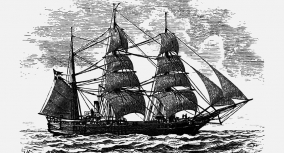
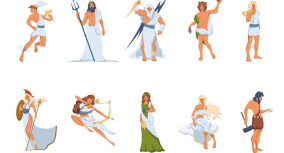
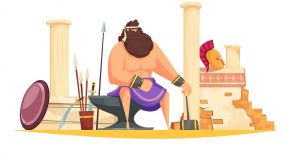
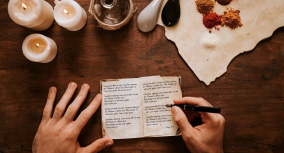


![Hamlet Themes: Death, Revenge, & Others [With Quotes]](https://custom-writing.org/blog/wp-content/uploads/2021/02/Themes-284x153.jpg)


